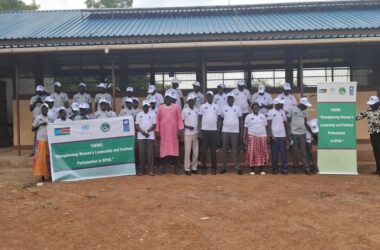
Story by Ephraim Modi D.S
An official from the Ministry of General Education and Instruction is calling on tax authority to remove taxes imposed on health and hygienic materials.
The Director General for Gender Equality and Inclusive Education at the Ministry of General Education and Instruction, Ms. Esther Akumu Achire made the statement on Thursday while addressing the celebration of world menstrual day.
Ms. Achire has pleaded to the government to eliminate levies set on menstrual health management kits so that it is sold at a cheaper price where every girl can afford.
“We are praying that the government will remove away the tax from the menstrual hygiene management materials. When the taxes are exempted and they are sold (out), they will be at cheaper price which a girl can afford,” the official said.
She further stated that the country should be capable of producing the mensural materials, or make reusable sanitary pads.
She said that lessons about menstrual hygiene should be taught in schools where young girls can learn from.
“We should learn how to produce the menstrual material even within the country and we are saying that the menstrual hygiene should be a lesson in the schools. For the other people who are deep in the village, we are trying to make sure that we produce the reusable sanitary towels within the country,” she said.
However, the government official has warned parents who take advantage of their daughters during menstruation, and hand them for marriage, and after that pregnancy.
She said, during time for giving birth, it may become a problem, and when problem comes, either they die or they may have fistula or they are disabled.
Ms. Achire has urged every responsible citizen to understand that menstruation does not show maturity and not a sickness, or dirty thing too.
She said every parent must ensure that the girls keep themselves healthy and clean without any interference, and without any stigma such that they are able to remain at school and healthy.
According to the 2014 survey, about 70% of girls in South Sudan do not have enough money to buy sanitary pads, and 27% of girls in primary school say pads are not available in their area. Fortunately, organizations are working to combat period poverty in South Sudan.


